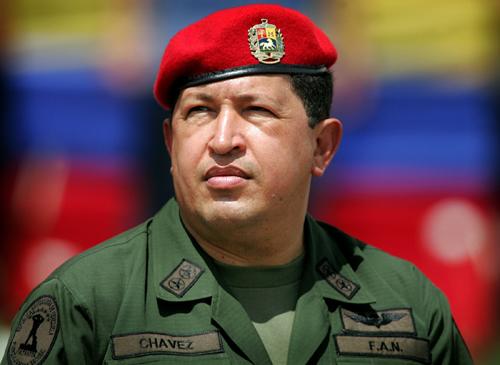Phuket Gazette World News: Venezeula’s Hugo Chavez loses battle with cancer

– World news selected by Gazette editors for Phuket’s international community
PHUKET: At two defining moments of his rule, Venezuela’s theatrical leader Hugo Chavez took a small silver crucifix from his pocket and held it above his head.
Both marked a quasi-religious “return” for the socialist ex-soldier whom supporters loved with messianic fervour – first from a 2002 coup that saw him jailed on a tiny Caribbean island, and then from cancer surgery in Cuba in June 2011.
As he held aloft the crucifix from a balcony of his Miraflores Palace after returning from surgery, the maverick president of South America’s biggest oil exporter said he was putting his fate in the hands of God and the Virgin Mary.
“Today, the revolution is more alive than ever. I feel it, I live it, I touch it … If Christ is with us, who can be against us? If the people are with us, who can be against us?” he said, working his supporters into a frenzy.
“But no one should think my presence here means the battle is won. No,” he cautioned, turning the screams of joy at his homecoming to tears at the fragile state of his health.
Chavez died in hospital yesterday, finally succumbing to the cancer after four operations in Cuba. His death ended 14 years of charismatic, volatile rule that turned him into a major world figure.
Ever the showman, Chavez would jump from theology to jokes, and from Marxist rhetoric to baseball metaphors in building an almost cult-like devotion among followers.
Throughout his presidency, he projected himself in religious, nationalistic and radical terms as Venezuela’s saviour, and it largely worked. While his foes reviled him and portrayed him as a boorish dictator, Chavez was hailed by supporters as a champion of the poor and he won four presidential elections.
He took over from his mentor Fidel as the leader of South America’s left-wing bloc and its loudest critic of the United States, winning friends and enemies alike with a cutting and dramatic frankness that no one could match.
When the cancer first struck, Chavez could have stepped aside to fight it.
Instead, he stretched his physical limits by staying at the front of his government while running a successful but hobbled campaign to win a new six-year term at an October 7 election.
Rural roots
Born the second of six sons of teachers in the cattle-ranching plains of Barinas state and raised by his grandmother Rosa Ines in a mud-floor shack, the young Chavez first aspired to be a painter or pitcher in the U.S. Major Leagues.
Attracted by the chance to play baseball, he joined the army at 16 and was eventually promoted to lieutenant-colonel.
Though mixing with left-wing rebels and plotting within the military from long before, Chavez burst onto the national stage when he led a 1992 coup attempt against then leader Carlos Andres Perez.
The coup failed and Chavez surrendered, but he cut a dashing figure dressed in green fatigues and a red beret for a famous speech live on TV before being carted off to jail.
His comment that the coup had failed “por ahora” (“for now”) electrified many Venezuelans, especially the poor, who admired Chavez for standing up to a government they felt was increasingly corrupt and cold to their needs.
The hint of more to come, plus the unashamed acceptance of responsibility by Chavez, made him a hero in some sectors.
“I thank you for your loyalty, your valour, your exuberance, and I, before the country and before you all, assume responsibility for this Bolivarian militant movement,” he said, instructing his fellow rebels to lay down their arms.
Pardoned in 1994 by Venezuela’s next president, Rafael Caldera, Chavez left jail and began a grassroots political campaign, eventually defeating a former Miss Universe to win a presidential election four years later.
By doing so, the former paratrooper ended the grip of Venezuela’s traditional parties and launched his self-proclaimed “Bolivarian Revolution” – named for Venezuela’s 19th century independence hero Simon Bolivar.
Chavez changed the nation’s name to the “Bolivarian Republic of Venezuela” and appeared in front of huge paintings of Bolivar, sending a subliminal message to Venezuelans that he was the modern reincarnation of their historical idol.
Slum hero
In the early days of his rule, Chavez enjoyed runaway popularity levels of 80 percent or more, especially in the sprawling slums of the capital Caracas.
His first big test surfaced three years in when he faced huge street protests and a build-up of withering criticism from political foes, business and labour leaders, Catholic bishops and even dissident soldiers.
But when military officers briefly pushed him out in their own coup in 2002, Chavez proved himself to be a survivor and bounced back to power after two days incommunicado and under arrest, some of it at an island military base.
In what he frequently refers to as his darkest moment – matched only by the cancer diagnosis he said Fidel, his friend and ally, broke to him in 2011 at a private Havana hospital – Chavez thought he was going to be assassinated.
In an incredible 72 hours for Venezuela, a counter-coup by loyalist troops and demonstrations by hundreds of thousands of outraged “Chavista” supporters forced Pedro Carmona, who had briefly seized power, to resign and restored Chavez to the presidency.
That led to his first “crucifix moment”.
The stocky, wiry-haired Chavez – whose favourite attire remained the paratrooper’s red beret and dark green uniform or a bright red shirt – became Latin America’s most colourful and controversial leader.
He soon became a household name from Middle America to the Middle East.
Allies say Chavez was misunderstood abroad, the victim of an unstinting U.S.-led propaganda campaign.
“They’ve called me a Mussolini or Fidel or said I sleep with a book by Hitler for a pillow,” Chavez once said. “But the people know the truth. They know who I really am.”
He combined traditional left-wing tenets of equality and wealth distribution with a fervent nationalism inspired by Bolivar.
His critics regularly accused him and his government of being corrupt and inept, and of steering the country towards a Cuban-style authoritarian regime. Certainly, a clutch of opponents ended up in exile or jail, normally on graft charges they said were trumped up.
Business detractors said his socialist reforms, including the expropriation of rural estates and the nationalization of much of the economy, including multi-billion dollar oil projects, destroyed jobs and scared off investors.
A decade of high oil prices allowed Chavez to spend huge amounts on social programs that became the linchpin of his support among poor voters.
They included his famous slum “missions” that provided free healthcare and education, plus subsidized food, clothes and even electronics, and are likely to be his biggest legacy.
All of his political opponents have vowed to continue them, in some form or other.
Chavez defended his “revolution” as a long-overdue crusade to close the yawning gap between rich and poor in Venezuela, which combines huge oil and mineral wealth with grinding poverty, widespread unemployment and rampant crime.
His praise for communist Cuba and Fidel Castro, combined with his courting of other anti-U.S. states like Iran, irritated Washington, which has long been the mai
— Phuket Gazette Editors
Latest Thailand News
Follow The Thaiger on Google News:


























